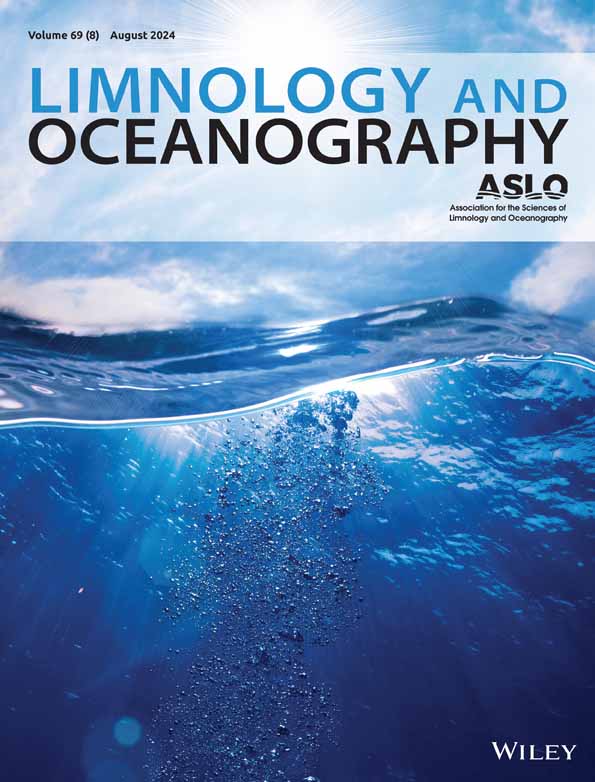气候变暖破坏了浮游动物物候和越冬策略
IF 3.7
1区 地球科学
Q1 LIMNOLOGY
引用次数: 0
摘要
浮游动物对食物网和生物地球化学循环至关重要。然而,与气候变化相关的变暖可能会改变它们的季节选择和繁殖策略。本研究通过比较被温水加热超过50年的波罗的海海湾与未受影响的对照湾,研究了长期变暖对浮游动物(主要是桡足类动物)物候和越冬策略的影响。野外观测结果表明,加热湾桡足类和浮游植物种群的生长开始时间早于对照湾,表明加热湾桡足类的丰度受温度和食物供应的共同驱动,而对照湾桡足类的温度依赖性更强。休眠卵通常是作为一种生命史策略而产生的,以在不利的环境条件下生存。我们的实验室孵化实验显示,与对照组相比,从加热海湾沉积物中孵化的休眠卵较少,支持越冬策略的进化变化。总之,研究结果似乎表明,桡足类动物在高温下调整了它们的生活史,减少了使用沉积物储存的休眠卵的策略,而是在有浮游植物食物的时候更早地开始了它们的春季发育。因此,这项研究表明,气候变化可以改变桡足动物的越冬策略,导致食物网的潜在级联效应,并影响整体生物多样性和生产力。本文章由计算机程序翻译,如有差异,请以英文原文为准。
Climate warming disrupts zooplankton phenology and overwintering strategies
Zooplankton are crucial for food webs and biogeochemical cycles. However, warming associated with climate change may alter their seasonal timing and reproductive strategies. This study investigated how long‐term warming impacted zooplankton (mainly copepods) phenology and overwintering strategies by comparing a Baltic Sea bay, heated by warm water discharge for more than 50 yr, with an unaffected control bay. Field observations showed that copepod and phytoplankton population growth began earlier in the heated bay than in the control bay, suggesting that copepod abundance was driven by both temperature and food availability in the heated bay and by a stronger temperature dependence in the control bay. Resting eggs are normally produced as a life‐history strategy to survive unfavorable environmental conditions. Our laboratory incubation experiment showed fewer dormant resting eggs hatched from the heated bay sediment compared with the control bay, supporting an evolutionary change in overwintering strategy. In conclusion, the results seemed to suggest that copepods adjusted their life‐history in elevated temperatures by relying less on the strategy of using sediment‐stored dormant eggs and instead started their spring development earlier, when phytoplankton food was available. Hence, this study suggests that climate change can shift copepod overwintering strategies, leading to potential cascading effects in the food web and affecting overall biodiversity and productivity.
求助全文
通过发布文献求助,成功后即可免费获取论文全文。
去求助
来源期刊

Limnology and Oceanography
地学-海洋学
CiteScore
8.80
自引率
6.70%
发文量
254
审稿时长
3 months
期刊介绍:
Limnology and Oceanography (L&O; print ISSN 0024-3590, online ISSN 1939-5590) publishes original articles, including scholarly reviews, about all aspects of limnology and oceanography. The journal''s unifying theme is the understanding of aquatic systems. Submissions are judged on the originality of their data, interpretations, and ideas, and on the degree to which they can be generalized beyond the particular aquatic system examined. Laboratory and modeling studies must demonstrate relevance to field environments; typically this means that they are bolstered by substantial "real-world" data. Few purely theoretical or purely empirical papers are accepted for review.
 求助内容:
求助内容: 应助结果提醒方式:
应助结果提醒方式:


